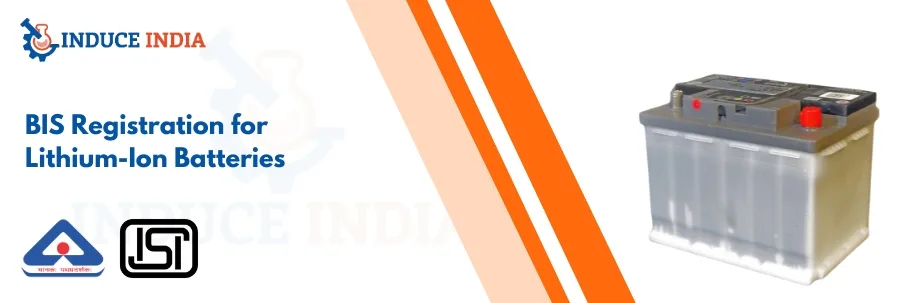The modern age of innovation and sustainability has placed lithium-ion batteries as the paramount technology that runs everything, including cell phones, laptops, electric vehicles, and energy storage systems. The more the population becomes accepting of lithium-ion batteries in consumer electronics and industrial applications, the more their quality, safety, and compliance have to be assured.
To protect the consumer’s interests, the Bureau of Indian Standards (BIS) may require lithium-ion batteries to be BIS registered before engaging in marketing activities in the Indian market. For companies such as Induce India, the difference between smooth operation in the market and failure could be made through an understanding of this regulatory framework and compliance with it.
What does BIS Registration mean?
The Bureau of Indian Standards is India’s apex national organization for the formulation of standards, set up by the Ministry of Consumer Affairs, Food, and Public Distribution. By its certification and testing mechanism, it ensures products are of high quality, safe, and reliable.
BIS Registration under the Compulsory Registration Scheme (CRS) is mandatory compliance for certain electronic and IT goods, including lithium-ion batteries (cells as well as packs). It certifies the product as conforming to the Indian safety standards and eligible to be sold on the Indian market.
Necessity of BIS Registration for Lithium-Ion Batteries
Lithium-ion batteries may endanger human beings through thermal runaway, fire, and leakage if not properly manufactured or handled. As a result, BIS has included lithium-ion cells and battery packs in the mandatory certification to secure:
- Safety of the consumer
- Protection of the environment
- Reliability of the product
- Standardization among the manufacturers
Specifically, batteries with lithium-ion systems come under IS 16046 (Parts 1 & 2):2018, in nominal accordance with IEC 62133 concerning secondary cells and batteries containing alkaline or other non-acid electrolyte systems.
Products Under BIS Lithium-Ion Batteries
As per the BIS notification, in the following lithium-ion products, registration is a must:
- Lithium-ion cells for electronic applications
- Lithium-ion battery packs (rechargeable)
- Batteries for mobile phones, tablets, and power banks
- Batteries for electric vehicles (as per a specific standard)
- Batteries for consumer electronics
It is important to note that the battery cells and battery packs shall be considered different products and must be registered separately.
Major Standards: IS 16046 (Parts 1 and 2)
The applicable Indian standards are:
- IS 16046-1:2018: Safety requirements for secondary lithium cells and batteries for portable applications
- IS 16046-2:2018: Safety requirements for lithium-ion batteries for industrial applications
The standards ensure compliance with safety performance criteria, such as
- Short-circuit protection and overcharge protection
- Temperature
- Impact resistance
- Safety against leakage and explosion
The BIS Registration Process for Li-ion Batteries
The BIS registration is a multiple-stage process that seems complex but can be managed smoothly with appropriate guidance. A brief to elaborate further:
The first step is sending samples to an Indian BIS-recognized laboratory.
The lab tests as per IS 16046 and issues the test report.
The validity of the report is for 90 days, and it must be used for the application within this duration.
- Application Submission
An application for registration is submitted through the BIS CRS portal.
The documents required are
- Manufacturer business license
- ISO 9001 certificate of the manufacturing facility
- Authorisation letter (if filed through an Indian representative)
- Test report of BIS-approved lab
- Technical specifications and product details
- Factory Inspection (If Applicable)
BIS may inspect the manufacturing facility to verify quality control processes and product consistency. In most circumstances, especially for foreign manufacturers, Authorized Indian Representatives (AIRs) take up the mantle and manage compliance.
- Grant of Registration
After the verification is complete, BIS issues a Registration Certificate. The manufacturer can then use the Standard Mark (BIS logo) on the product package.
Time Frame and Validity
Normally, the registration process takes 4 to 6 weeks, subject to all documentation and testing processes going well. BIS registration is valid for 2 years, after which it must be renewed.
Labelling and Marking Requirements
Products once registered by the BIS must carry:
- The Standard Mark (logo of BIS)
- The registration number
- Details of the manufacturer
- Model number and brand name
Incorrect labelling or misuse of the BIS mark would invite penalties, including cancellation of the license.
Penalties for Non-Compliance
The goods of unregistered lithium-ion batteries are prohibited under Indian law. Heavy fines can be imposed on sellers and importers, such as
- Seizure of goods
- A ban on imports
- Legal action under the BIS Act
Hence, compliance is not voluntary; rather, it is mandated by law.
How Induce India Helps
The BIS registration process could be confusing, particularly for manufacturers or importers doing it for the first time. Induce India offers complete compliance solutions and includes
- Product assessment and pre-testing consulting
- Selection of BIS-approved laboratories
- Documentation support
- Filing of the application and necessary follow-ups
- Liaising with BIS officials
- Renewals and ongoing compliance support
We want to see your go-to-market journey be smooth, legal, and speedy.
Recent Updates You Should Know
BIS keeps updating its list of mandatory items, and some trends of late are:
- Increasing focus on EV batteries
- Increased quality checks and decreased tolerance for non-compliance
- Increased perceptions of the environment and recycling standards
Keeping track of such updates is important to keep the business running in the long run.
Conclusion
In the future, with India opting for greener technology, the demand for lithium-ion batteries would keep growing. However, with growth comes huge responsibility. BIS registration must not be treated as just another formality. It rather entails demonstrating your commitment toward safety, quality, and consumer trust.
Manufacturers, importers, and OEMs have to join forces with a trusted compliance partner, Induce India, to stay ahead in this competitive and ever-changing market. Ensure the compliance of your lithium-ion batteries with Indian standards before submitting your BIS registration application.



